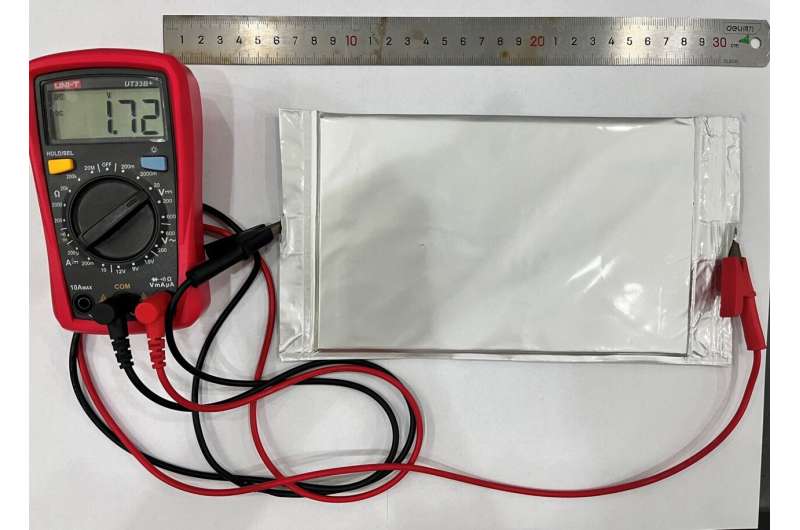This article has been reviewed according to Science X's editorial process and policies. Editors have highlighted the following attributes while ensuring the content's credibility:
fact-checked
peer-reviewed publication
trusted source
proofread
Eco-friendly aluminum battery lasts 10,000 cycles with minimal loss

Large batteries for long-term storage of solar and wind power are key to integrating abundant and renewable energy sources into the U.S. power grid. However, there is a lack of safe and reliable battery technologies to support the push toward sustainable, clean energy. Now, researchers reporting in ACS Central Science have designed a cost-effective and environment-friendly aluminum-ion (Al-ion) battery that could fit the bill.
Lithium-ion (Li-ion) batteries are in many common consumer electronics, including power tools and electric vehicles. These batteries are ubiquitous because of their high energy density. But lithium is cost prohibitive for the large battery systems needed for utility-scale energy storage, and Li-ion battery flammability poses a considerable safety risk.
Potential substitutes for reliable long-term energy storage systems include rechargeable Al-ion batteries. However, their most common electrolyte, liquid aluminum chloride, corrodes the aluminum anode and is highly sensitive to moisture, which exacerbates the corrosion. Both factors contribute to poor stability and a decline in electrical performance over time. So, Wei Wang, Shuqiang Jiao and colleagues wanted to design an improved Al-ion battery without these limitations.
The team added an inert aluminum fluoride salt to an Al-ion-containing electrolyte, turning it into a solid-state electrolyte. The aluminum fluoride salt has a 3D porous structure, allowing aluminum ions to easily hop across the electrolyte and increase conductivity. Additionally, when the researchers constructed their Al-ion battery, they used fluoroethylene carbonate as an interface additive to create a thin solid coating on the electrodes to prevent the formation of aluminum crystals that degrade battery health.
In experiments, the battery's moisture resistance as well as physical and thermal stability were enhanced, allowing it to withstand repeated jabs from a sharp object and temperatures as high as 392 degrees Fahrenheit. The solid-state Al-ion battery also had an exceptionally long life, lasting 10,000 charge-discharge cycles while losing less than 1% of its original capacity.
Moreover, most of the aluminum fluoride could be recovered with a simple wash and then recycled into another battery with slightly diminished performance. The new battery could reduce the production cost of Al-ion batteries and extend their life, thus increasing their practicality.
"This new Al-ion battery design shows the potential for a long-lasting, cost-effective and high-safety energy storage system. The ability to recover and recycle key materials makes the technology more sustainable," says Wang. The researchers add that further improvements in energy density and life cycle are needed before commercialization.
More information: Ke Guo et al, A Recyclable Inert Inorganic Framework Assisted Solid-State Electrolyte for Long-Life Aluminum Ion Batteries, ACS Central Science (2024). DOI: 10.1021/acscentsci.4c01615

















